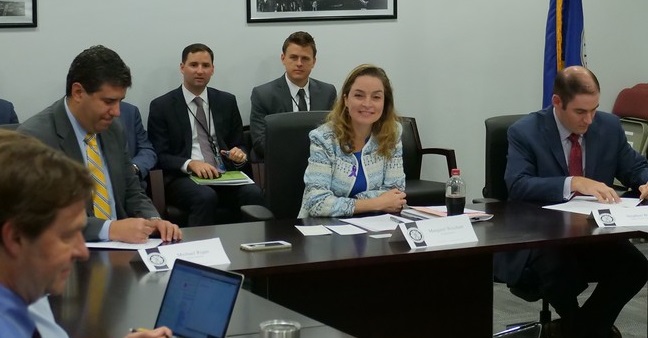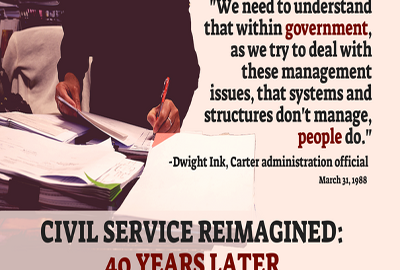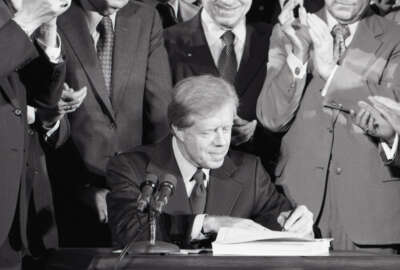
OPM announces first batch of civil service changes, ‘more to come’
The Office of Personnel Management said it will soon sign off two separate direct-hire authorities and will begin initial steps to develop a special occupational...
Just days before the Civil Service Reform Act will celebrate its 40th birthday, the Office of Personnel Management on Thursday announced three major steps it will take to change the way agencies hire and compensate new talent in certain positions in the federal government.
OPM has finalized two separate direct-hire authorities for both IT and cybersecurity positions, as well as science, technology, engineering and math (STEM) occupations for all agencies.

“These are areas that the team at OPM had thought very deeply about how we get better,” Margaret Weichert, new acting OPM director, told reporters Thursday morning. “Over time, there will be a host and a portfolio of changes that we’re going to recommend.”
In addition, the President’s Pay Agent, which includes the OPM and Office of Management and Budget directors and the Labor secretary, will use a 30-year-old authority to create a special pay and classification system for a specific occupations. OPM is most interested in developing a special system for economists, which the agency has identified as a high-risk, mission-critical occupation.
The agency said it hopes it can develop new systems for three-to-five other occupations within the next year.
OPM’s now former director, Jeff Pon, had outlined an ambitious plan to design alternative personnel systems and take greater advantage of direct-hire authority for certain occupations. But Pon was only in office for six months, and he never got a chance to make any specific announcements.
None of these initiatives is ready for primetime just yet. Agencies can begin using the STEM direct-hire authority to fill occupations in the engineering, biological sciences, physical sciences, math, statistics and actuarial sciences and economists fields.
Direct-hire authority for cybersecurity and IT positions will likely take longer, as OPM must still propose regulations and comply with the details of an executive order the president signed last spring.
A new special occupational pay and classification system won’t appear overnight, either. OPM said it has established an interagency working group, which will begin the process of soliciting and collecting feedback from other organizations and labor groups. The group will also hold a public hearing.
Still, the administration has an ambitious timeline in mind. It wants to have the new pay and classification system up and running by next spring.
As Weichert and other OPM officials reiterated with reporters, these three initiatives are just the beginning. More will come, including administrative guidance and legislative proposals.
Weichert said she spoke with Republicans and Democrats in Congress over the weekend about OPM’s plans. She said lawmakers are supportive and interested in the prospect of reviewing Title 5 and OMB’s reorganization proposals.
Feedback from the Federal Employee Viewpoint Survey (FEVS) also informed these initiatives, Weichert said. The data indicated that agencies are largely failing to live up to the merit system principles that Congress and the Carter administration codified in the Civil Service Reform Act 40 years ago.
Holding up a card with the values printed on it, Weichert clearly wanted to send a message about the merit system principles, which ensure fairness and integrity in the federal hiring and firing system.
These values informed the initiatives that OPM and OMB would roll out in the coming months, she added.
Though Weichert said she and OPM were celebrating and acknowledging the 40th anniversary of the civil service reform law, today’s federal workforce has outgrown the statutes and provisions that informed the 1978 act.
Agencies have 99 percent fewer clerks and 80 percent fewer secretaries today than they did in 1978. In contrast, government has 200 percent more computer specialists in 2018 than it did 40 years ago.
“Although incredibly well-intended, all of the original components of Title 5 and updates to it since then were well-intentioned, but layers and years of statute and added regulation have made it very complex and very cumbersome to operate nimbly and agilely in the 21st century,” Weichert said.
The National Academy of Public Administration, Senior Executives Association, Partnership for Public Service and the Volcker Alliance all announced their support for OPM’s new initiatives.
Chaotic times at OPM
It’s been a chaotic year for many OPM employees. OMB’s reorganization plan made significant proposals to shift much of the agency’s current services and functions to other agencies altogether.
The agency lost its first permanent director in two years after just six months on the job. Many employees learned of the White House’s decision to replace Pon with Weichert late last week from the media.
Weichert referred reporters’ questions about her predecessor to the White House and said she was “grateful for his service.”
“Why the president asked me to serve in this role is that it’s about the President’s Management Agenda,” she said. “It’s about the integration [of] IT, people and data and all of the cross-agency priority goals that we’ve talked about. I have a perspective on how all these complex capabilities work together to deliver on mission. I would say I have a lot of experience in driving complex, large organizational change.”
She acknowledged that change can be a confusing time for the rank-and-file and said government lacked true change-management specialists who can foster and steer culture change.
“At the end of the day, the message that I have from my teammates is not that change isn’t going to happen,” Weichert said. “Change is happening, and it must happen for us to continue to deliver I know that our people want for the American people. What I think people want to hear is, ‘Am I OK? My job matters to me because it’s how I pay my bills. It’s how I take care of my family.’ That is not trivial. It is not something we can be glib about.”
Weichert met on Tuesday morning with OPM senior executives, and she’s asked her team to set up meetings with employees at the agency both in and outside Washington. Email communication has been slow so far, as OPM’s email system was down on Friday and is still recovering.
In an email to OPM staff sent on Thursday, Weichert said she looked forward to meeting the agency’s employees to “listen and learn about the challenges facing our workforce.”
“While I understand change is hard, I firmly believe that dedicated civil servants, like yourselves, will continue to diligently work to help those that help hardworking Americans,” Weichert wrote in the email. “Public service is a higher calling, not an avenue to entitlements, but a vehicle to serving the country.”
Copyright © 2025 Federal News Network. All rights reserved. This website is not intended for users located within the European Economic Area.
Nicole Ogrysko is a reporter for Federal News Network focusing on the federal workforce and federal pay and benefits.
Follow @nogryskoWFED





